There are now so many podcasts out in the world, approximately 550,000 according to Nielsen, that reaching audiences and gathering new listeners can seem like a daunting and almost impossible task.
Whether you’re just starting out or you’re a veteran podcaster it’s always worth looking at new tools for promotion to get your brand out there and to show the globe why your podcast is the one we should be listening to. Here is a list of 10 handy tips, from the incredibly obvious to the more advanced methods to promote your podcast.
#1. Using Social Media the Right Way
It almost seems too obvious to start with social media, but there’s no escaping this important and incredibly effective promotional tool. Wherever you look, people are publicising their businesses and advertising their products on social media. From the local shop down the road to the multibillion-dollar franchise they are all using social media to promote their product and with approximately 3 billion people using it worldwide it only makes sense that you should too.
Make sure you post online before every episode of your podcast to let people know when it is due for release; what they can expect and who or what will be featured. This will intrigue potential listeners and provide them with information on how to access your content. Scheduling posts to go out at different times of day using applications such as Tweetdeck or Facebook’s page manager will help you to target different audiences and help to grow your fanbase and expand your reach.
Paying for advertising through social media can also help to boost your posts and expand your reach to as many people as possible. You can choose anything from boosting posts for a few days which will only cost you a few pounds to boosting posts indefinitely and being a featured page on peoples newsfeeds and sidebars which will cost a bit more.
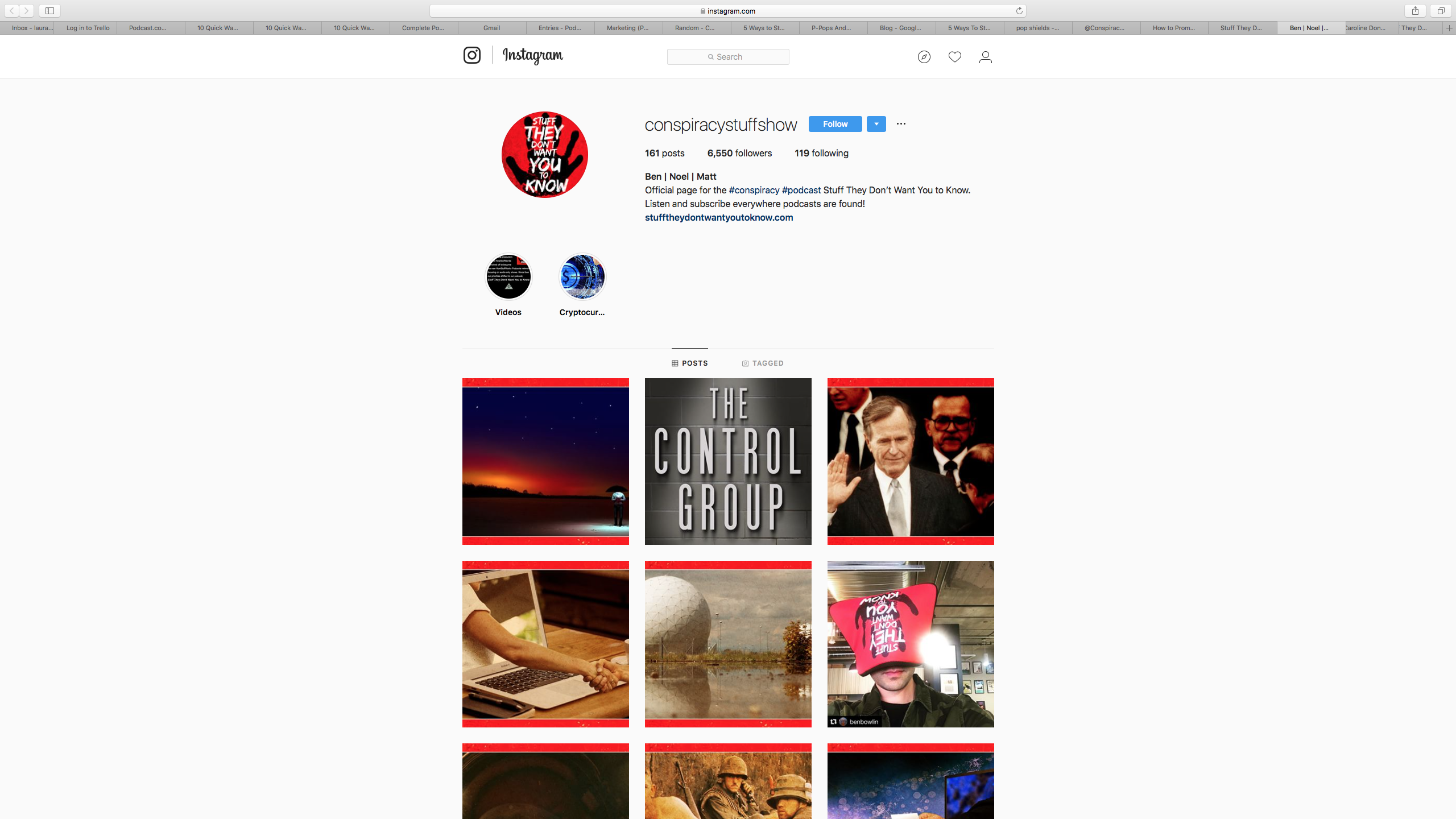
If you’ve got a special guest or important person featured in the show, make sure to tag them and encourage them to share the posts with their own followers. New audiences are more likely to start listening to your podcast if they think that someone they are already a fan of is going to feature. They are also likely to share your posts outside of your usual circle and therefore increase your reach and potentially your following.
The Stuff They Don’t Want You To Know Podcast has an immense following on social media. They have over 654k page likes on Facebook, over 18K followers on Twitter and over 6K followers on Instagram. They adapt their content and social media usage dependent on the platform they are using. Switching round a mixture of photos, videos, text posts and links. On Instagram they use images that represent each episode of their podcast so that it’s not too text heavy.

Accessibility is key so adding links to your social media posts will not only help potential audiences access your podcast or related content but will also allow them to share content directly to their own friends and followers. It is also important to remember to adapt everything to the social media platform you are using, for instance, people are used to seeing images on Instagram rather than written content, therefore, publishing images with minimal text will work more effectively.
Constantly checking your analytics will help to further expand your reach and profile. Facebook rather handily breaks down what kind of following you have on your page and suggests ways to further boost your posts and content. It also shows who is accessing your social media giving a breakdown of gender, location, age and language. If you notice that specific audiences aren’t accessing your content as much as others then you can work on crafting your posts to target specific people you wish to reach.
#2. Featuring on Other Podcasts (Preferably, More Famous Ones)
It goes without saying that people are more likely to find out about your podcast if you feature on someone else’s. It also helps if other podcasters come onto your podcast because their listeners will inevitably follow them.
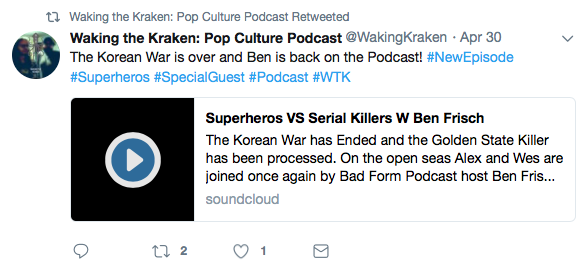
Promoting each other on social media will offer the opportunity for audience crossover and will allow for wider sharing of your content. Adding another podcaster into the mix will also help to keep your output fresh and help inspire new ideas for features or new segments within your podcast that engage a different type of audience and will lead to further promotion on their part.
The Waking The Kraken podcast by Alex Koeneman and Wes Potts, a podcast about popular culture has featured other famous podcasters on their podcast several times. They’ve featured the likes of Cayleigh Elise from the Rob Dyke’s Seriously Strange podcast and Ben Frisch of the Bad Form Podcast. This has helped to grow their listenership and promote their podcast.
#3. Sponsorships (& How to Make Money)
If you use specific equipment to make your podcasts or if you talk about specific companies or products in your podcasts it is definitely worth asking for sponsorship.
The Rise and Grind Podcast with Daymond John, a podcast about business and entrepreneurship, is an example of a successful sponsored podcast. The podcast is sponsored by ZipRecruiter which is made clear from the content and branding of the podcast.
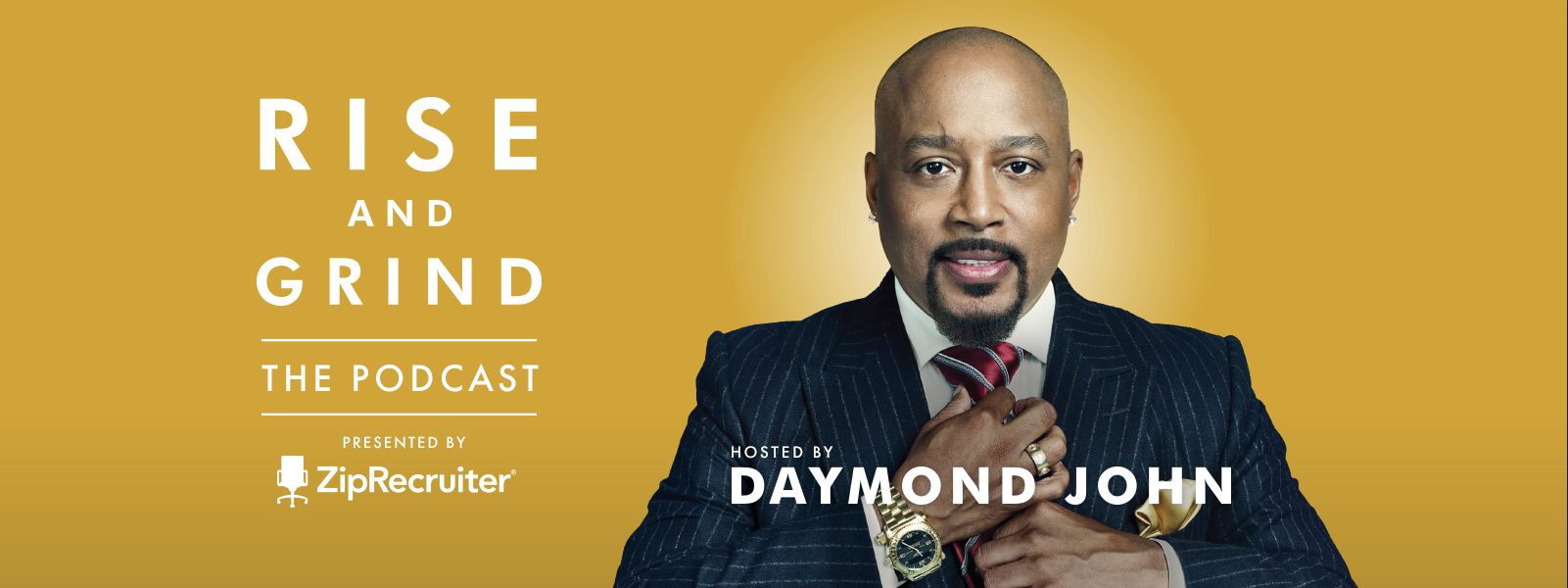
Every episode begins with Daymond telling us that the podcast is powered by ZipRecruiter, whilst the podcast artwork has Presented by ZipRecruiter written on it directly underneath the podcast name. What makes this sponsorship a little different though is the fact that ZipRecruiter play a small part in the show.
Most podcast sponsorships include a short advert that a lot of people often skip past but ZipRecruiter advertises their product at the beginning of the show and then teases that they’re going to turn up again later on. When they return they offer the listener interesting business tips, stories or advice. This has proved to be very successful for both the podcast and the sponsor.
Side note, Podcast.co have kept things simple so you can earn whilst you podcast. Using Patreon and PayPal, you can now accept donations for your podcast. Monetise your shows and turn your passion into a profitable business.
There are a few popular sponsors in the podcasting sphere. These include Squarespace, Audible, Mailchimp and LegalZoom. It sometimes seems as though you can’t move for podcasts sponsored by Squarespace or Audible but there’s good reason why they’re such a popular choice. Podcasting is rising in popularity and the companies mentioned above were rather early adopters of podcast sponsorship.
They obviously had an eye for where podcasts were going and realised their potential. They also realised that especially in the earlier days people who were listening to podcasts were more likely to be tech-savvy and entrepreneurial than people who partake in other media.

The companies above deal in technological and entrepreneurial business so they knew that podcast listeners were the kind of people they wanted to attract. Sponsors tend to go for podcasts that’s content involves popular culture, business and technology because as stated above those podcasts have the listeners they most want to target. Don’t worry though if your podcast isn’t about any of those things, someone will want to sponsor it. It really is as simple as book companies will want to sponsor book podcasts, gaming companies will want to sponsor gaming podcasts and sport companies will want to sponsor sporting podcasts. It’s just up to you to contact who you think will be most relevant.
The most obvious sponsorship to ask for is money or to sell advertising space. It has been known for podcasters to sell advertising space before they’ve even started the podcast itself so it’s certainly worth a try. The companies that will sponsor you will most likely advertise you themselves therefore giving you further promotion and a wider audience reach.

If you don’t think your podcast is big enough to ask for monetary sponsorship or you want to keep your podcast ad-free then you can instead ask for sponsorship in other ways. Asking sponsors to give you free equipment if you endorse their products in the podcast is one way of achieving this.
If you already use a specific companies products you can ask for free merchandise for yourself or to give away to your listeners. Not only will this further endorse the company it will help promote your podcast by aligning your content with notable brands and showing to potential audiences that you’re on a similar level to them. It will also encourage people to listen who are fans of the company you are endorsing. It may not seem as though a person would listen to a podcast because you use the same headphones that they do but the reality is actually quite surprising.
Not all companies will be willing to part with their money or give things away for free but most will happily promote you on social media if you ask them to. A simple post on Twitter from a notable company about your podcast can easily generate a larger audience and more promotion opportunities.
#4. Adapting Your Podcast for Other Platforms
As ever, user accessibility is key and enabling the ability for audiences to access your podcasts anywhere at any time is crucial. That being said it’s important you provide ways for your podcast to be commented on and shareable. Uploading your podcasts to other platforms after they have been officially released will help to further your promotion. Adapting your podcast for playback on sites such as Soundcloud, Mixcloud, YouTube and Vimeo will lend itself nicely to being shared on social media.
It is important to consider the way your podcast looks on these individual sites because the normal aesthetic of your podcast will be changed considerably when shared to these platforms. Creating thumbnails for Mixcloud and Soundcloud that represent your podcast will help new audiences to get a feel of what it’s about.
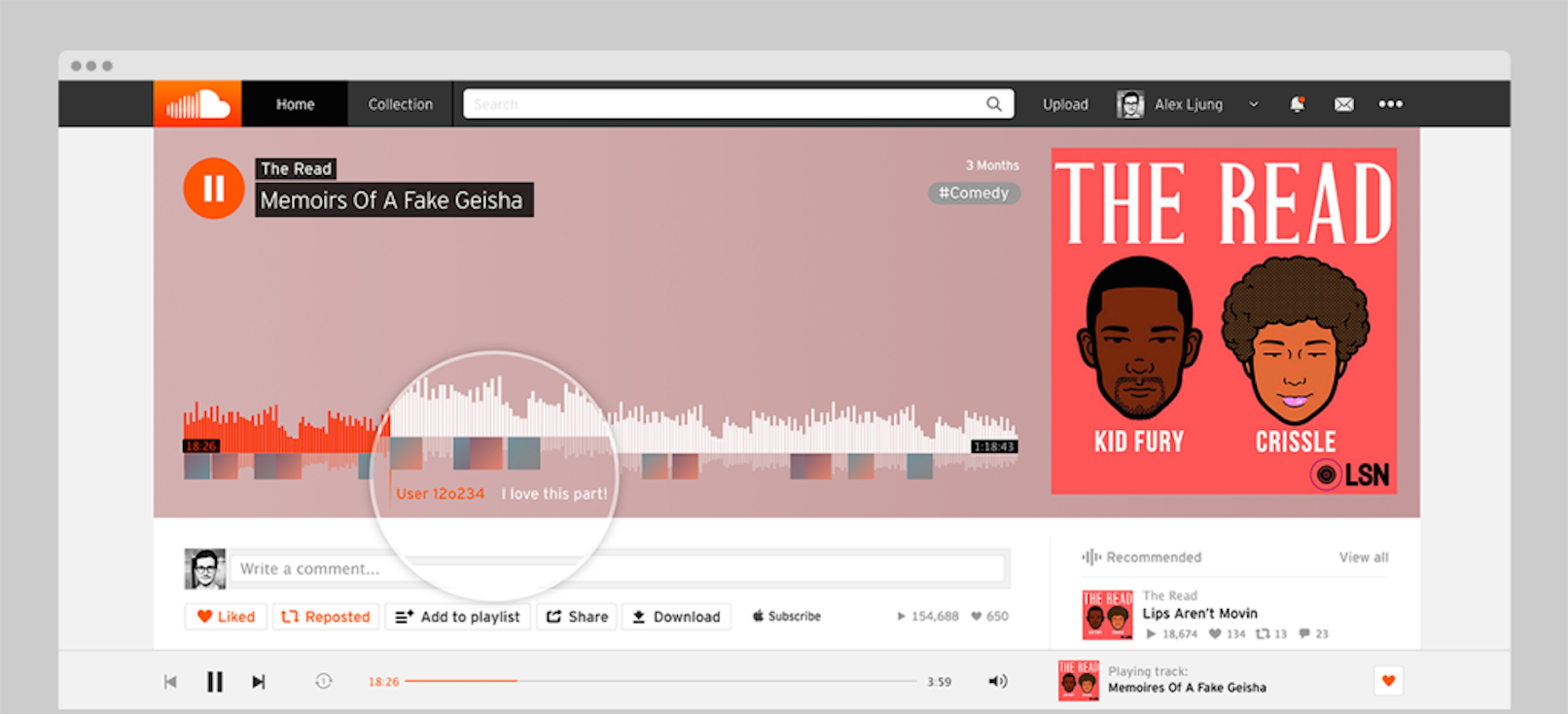
YouTube and Vimeo are both visual sites and appropriate changes should be made to your podcast to adapt to this. It can be something as simple as creating an image that represents your podcast or as complex as transcribing the podcast and putting the words onto different backgrounds, either way it shows that you’ve thought about how your podcast looks on all platforms and leaves no potential audience members thinking that their platform of choice has been neglected.
#5. Giveaways & Freebies (AKA: Everyone Loves Free Stuff)
Giving away prizes can help to promote your podcast in several different ways. People always like to take part in competitions so offering the opportunity to your listeners will undoubtedly gather some attention.
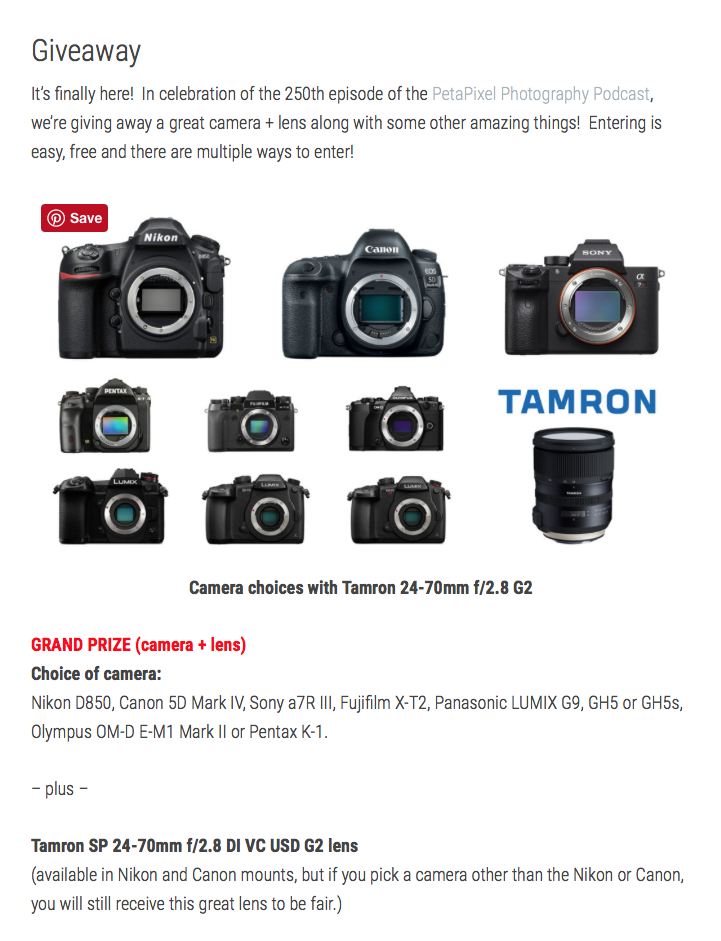
The PetaPixel Photography podcast has done some great giveaways to celebrate milestones of the podcast. They are currently celebrating the release of their 250th episode and their sponsor Lens Shark has given them a camera and lens to give away to a lucky listener.
There a few different ways to enter including subscribing to the podcast and sending a screenshot proving you have done; listening out for the secret code word they’ve put in their 250th episode and emailing your answer to their website or following the sponsor's newsletter and Instagram. Doing each of these actions earns you points that put you higher up the ranking to win the prize. Each method is a great way to promote your podcast and your sponsor who will also be promoting your podcast on their social media.
The most obvious prize to give away is merchandise. Having merchandise available for purchase is an excellent way to advertise your podcast of its own accord. It only takes one cool kid to start wearing your t-shirt and then everyone wants one. Giving away merchandise in return for promotion is a two in one advertisement. Telling your followers to share or invite ten of their friends to your page in return for being put into a prize draw to win your merchandise will promote your podcast twice, once on social media and again outside in the real world. Offering your sponsors merchandise or equipment as a prize will also help to promote your podcast in two ways, once on social media and once through your sponsor.
Offering other opportunities as prizes such as giving away the chance for a lucky listener to feature on your podcast or allowing the public to come up with ideas for content for your next show will get people talking about your brand on social media and further promote your podcast.
#6. Meetups, Socials, & Shows
This one’s for more established podcasts that already have a reasonably large following and are looking for ways to further promote their podcast outside of the internet sphere. It is most likely that you have tried other forms of promotion and they’ve proved to be very successful so now you’re looking for something a little bit different.
Organising fan meetups is an excellent way to bring your fanbase together. The fans may also bring friends and relatives to these meetups which will further expand your audience and may lead to promotion from new fans. The advertisement of the event and the pictures and posts that end up online from fans after the event will get quite a lot of attention from people who may not be familiar with your podcast. It is also clear that happy fans who feel as though they’re part of a community will be more likely to promote you on their social media, buy your merchandise, continue listening to your podcasts and engage with your online or outside content.
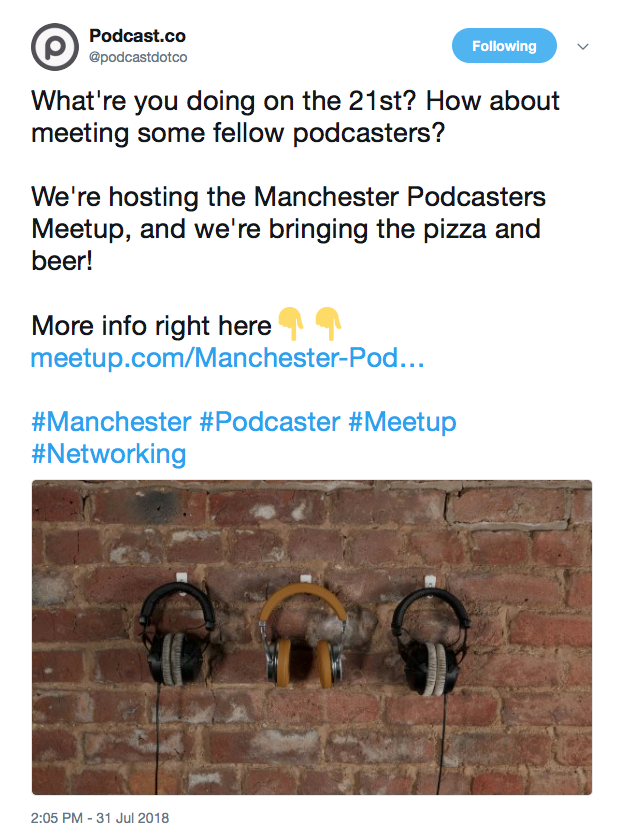
There are also several podcasting meet ups that happen around the world and the likelihood is there’s one happening in your nearest city very soon. This will give you the chance to promote your podcast to other podcasters, network and find other podcasts to go on and find podcasters who want to collaborate with you and share their ideas.
There will be a Podcasters meetup happening in Manchester, UK on the 21st of August at 4pm. Come along to meet other podcasters, learn more about podcasting and enjoy free pizza and beer.
Taking your show on the road or adapting it to suit the theatre can increase your brands revenue and podcasts worth. It makes sense that developing your podcast for a completely different platform will encourage new audiences to take notice of you and therefore will expand your promotional circles.

The famous podcast Welcome To Night Vale has created a stage show that tours the world. The show is Stan alone from the podcast so that new audiences can come and enjoy it without having to know the context in the podcast. The podcast inspires fans to come dressed up as their favourite characters and has gained a cult following. The promotion of these die hard fans means that the podcast continues to release audible content, merchandise, new live dates and books. Touring different cities and countries with your podcast allows for the opportunity to meet new people and gather new audiences. Theatres, radio stations and other live venues will most likely do a lot of promotion to say you’re coming to town so people will probably come to see you out of curiosity and will hopefully leave as a brand new fan.
#7. Teasers, Best Ofs, and Last Time on…
Giving people snippets of your content is a great way to let them know what to expect. In this social media world we’re very used to the short 30 second clips of cats falling over that our friends shared on Facebook. The size of these videos are ideal to watch on your work break, on the train and whilst you’re waiting for that delivery to turn up. Podcasts are usually longer than 30 seconds so most people tend to want to schedule them into their lives for when they know they’ll have a longer time to listen.
If a full podcast is shared to Facebook or Twitter the likelihood is it’s not going to be listened to there and then by the recipients. What they will listen to however is a short snippet that tells them what to expect in the next episode, a compilation of some of the best, funniest or most interesting parts of your podcast or a recap of something interesting that happened in the previous episode so that the listener feels they have to catch up.
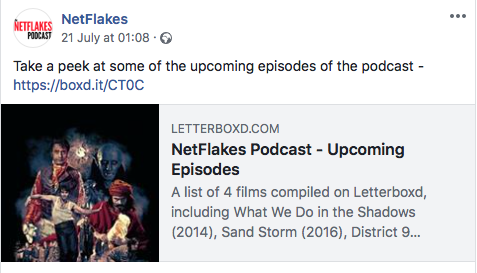
The Netflakes podcast, a podcast about the shows that are available to stream on the Canadian Netflix always tease what’s going to be coming up in their new episodes. You know exactly what to expect from their podcasts and you know if they’re going to be talking about a show or film that you want to hear about. This works really well for them and has helped them to gain a large following.
Creating a teaser letting people know what’s coming can give a brief insight to a potential listener as to what they should expect. Hollywood have been doing this for years in the form of trailers and they’re doing quite well. It’s a good idea to share these snippets with groups or people you think would find them interesting. For instance if you have a football podcast sharing a teaser into footballing groups on Facebook will be an excellent way to focus your promotion. The more intrigue you create the more likely you are to gain new listeners who will do a lot of the promoting for you.
Creating short best of reels that highlight some of the most interesting segments of previous podcasts is an excellent promotional tool. If one person finds something you said particularly interesting or funny they will share the clip on social media or show their friends. It doesn’t take much for something to go viral these days so if you get this right you could well be the next viral sensation.
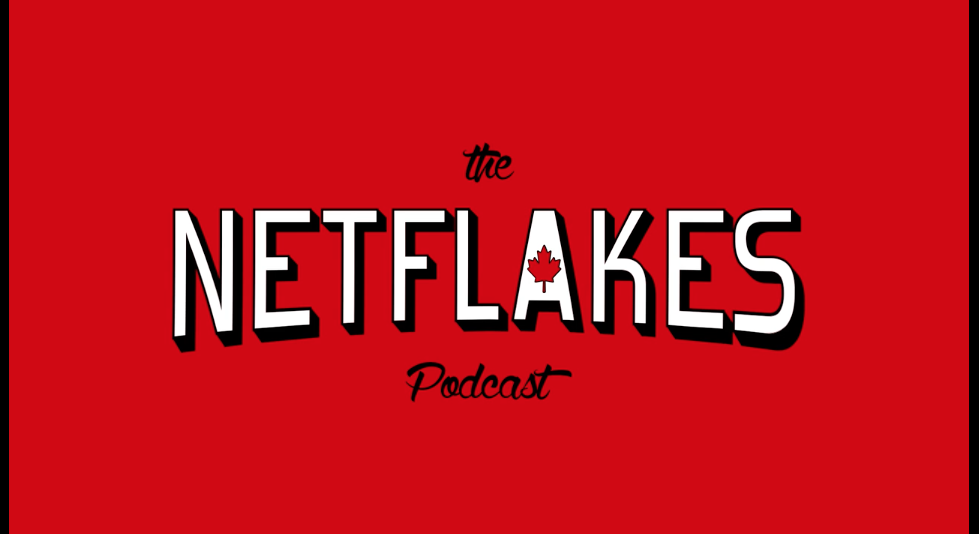
A potential listener may have seen your podcast being advertised or been told they need to listen to it by their friends, but there’s just one problem… They’ve come to find your podcast and noticed that there’s already 152 episodes. It’s too late to catch up now and if they start listening from where they are they’re not sure they’ll understand or enjoy the podcast as much as someone who’s been there from the beginning.
That’s why creating a short synopsis of what happened in the previous episode is so important. Making it clear that people can join in at any time and providing new listeners with ways to stay up to date with what’s happening is a great way to expand your audience. This in turn will of course lead to further promotion and of course those small recap clips you make will most likely open up discussions and further shares of your podcast.
#8. Search Engine Optimisation (With a Sprinkle of Clickbait)
All your favourite podcasters, YouTubers, and news outlets have been guilty of tempting in those all-important clicks by using clickbait titles or using search engine optimisation. If they do it, so can you. All this does is inspire intrigue and encourages potential new listeners to find out what you’re about. If you can tempt them in by making your adverts and content more noticeable then it makes sense to try.
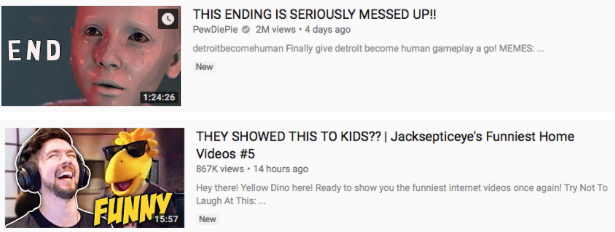
YouTubers are perhaps the most prolific for doing this as they want people to watch their videos because views equal revenue. Even if a person clicks on the video for five seconds that’s more money generated for the Youtuber. It’s therefore ideal to have a vague or intriguing title and picture that encourages those all important clicks. You only need to look at the success of YouTubers such as PewDiePie and Jacksepticeye to see that doing clickbait correctly can be an important promotional tool.
Clickbait is a tool used by many different businesses, websites, podcasters and Youtubers to encourage people to click on their webpage and discover their content. Clickbait tends to use phrases or terms that will allure a desired target audience to click on the webpage often by using language that will shock, amuse, excite or sadden. If something particularly exciting happened in your most recent podcast then put a snippet up from the episode under a reasonably exciting yet mysterious title that will attract a potential listener to come and find out what it was they missed. Clickbait often gets shared quite rapidly on social media therefore it is an excellent and simple way to promote your podcast.
Clickbait isn’t completely free of criticism though and it definitely has its downside. The main problem with clickbait is that it promises content that often isn’t there. A misleading headline or image is often posted that grabs peoples attention and then they click on the post only to find out that it wasn’t about the subject matter they expected after all.
A lot of news outlets, podcasters and Youtubers spend more time thinking about their clickbait title than they do the content of the actual thing they’re promoting. This means that the clickbait headline looks exciting but the actual content doesn’t match in quality leaving audiences disappointed and angry. It is also believed that clickbait insults the audience's intelligence, tricking them into looking at content that they wouldn’t usually look at.

If you are going to use clickbait as a way to promote your podcast make sure that the title matches what the content delivers so that you don’t mislead potential listeners and that the clickbait title matches the quality of the podcast you have produced.
Search engine optimisation is a little bit more complicated but if used correctly can be incredibly effective. All search engines aim to provide the most relevant information with its users so it puts what it believes to be the most relevant web pages at the top and the least relevant web pages at the bottom.

If someone Googled the word “podcast” then millions of results would come up where the word podcast is mentioned. In amongst those results would be your podcast but the likelihood is you won’t be at the top, you might not even be in the middle. The best way to make sure you come towards the top of those searches is to make sure that search engines know every keyword that you think is relevant to your podcast. You can use tools such as Serpstat to help you do this. Through Serpstat you can research keywords, analyse competitors and find out what keywords other similar web pages are using to get to the top of search engine results.
There are many ways to get to the top of those search engine results including page titles, meta tags and sitemaps. If your most recent podcast is about comic books then you will want to tag every comic book you talk about as well as any other relevant things you talk about in your podcast. If therefore someone searched for “Podcasts about Superman” and you have included “Superman” and “podcast” in your meta tags or page titles, then you are more likely to turn up at the top of the Search Engine as being a more relevant website. This makes you easier to find and easier to share. If you’re struggling with Search Engine Optimisation then use the website Yoast as they are the font of SEO knowledge.
#9. Providing Social Proof with Listener Reviews
When you’re going on holiday, to a hotel, buying a new car, going to a museum or even sending your child to a new school it’s inevitable that you’ll check reviews before you do it. That restaurant down the road has had nothing but five-star ratings from everyone that’s been there and so you just know you’ve got to try it, that’s promotion within itself.
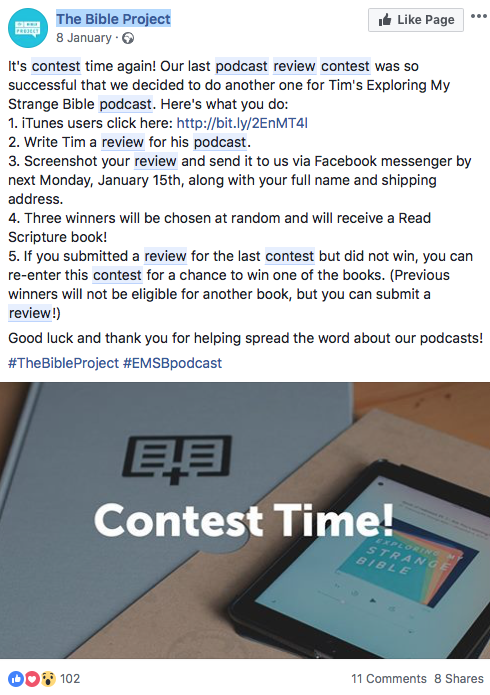
People will often become interested in something if they think that everybody else is doing it and enjoying it. If people click on your Facebook page and see that your podcast has glowing reviews they’ll be worried they’re missing out on something great. The Bible Project podcast, a religious podcast focusing on the stories of the bible has achieved great success through asking for reviews in return for prizes. They have so far gained over 3K reviews on Facebook by running these competitions.
You can ask people to leave reviews on your websites and social media. If people buy merchandise send them an email asking if they’d review your show. They must be enjoying it to buy merchandise so it’s most likely they’ll leave you a glowing report. Check your subscribers list and ask the people on it to write you a review. They’ve subscribed because they want to hear more content and therefore must be enjoying what you’ve already put out. It’s only reasonable thinking to ask them if they’ll write you a review. The reviews that your fans will write will draw people to your podcast and let people know what hey can expect from you.
Another great way of hosting a competition is to ask for reviews in return for prizes. Let your audience know that you will pick so many winners at random from new reviews that have been posted on a specific date. It might see like cheating but it’s definitely not. You must make sure that you announce this within an episode of your podcast though because posting this competition on social media will only encourage generic feedback from people who’ve never listened to you.
#10. Responding, Tagging, and Reaching Out to Fellow Podcasters
When you’ve done everything on the list and your podcast is the most famous one in the world there’s still things that can be done to make sure your promotion continues to be positive and that your audiences remain loyal.
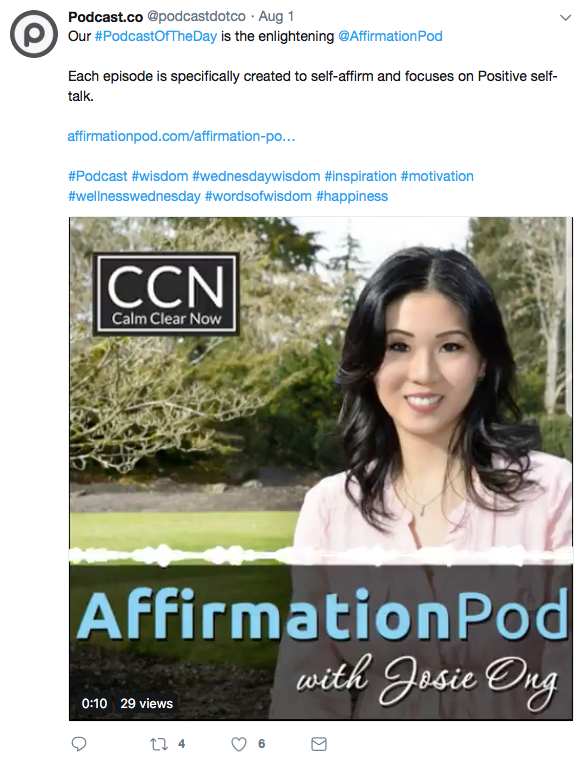
The best promotional tool is one to one conversations with fans, potential fans and other podcasters. Continuing to respond to them, share relevant material and tag people in posts keeps people engaged and also means that others won’t stop promoting for you. Podcast.Co often reach out to other podcasters and show that we appreciate the work that they’re doing, this helps us to maintain a good relationship with our audience. We do this through posting our Podcast of the day to encourage engagement and interest.
If people tweeted saying that they enjoyed an episode, give their tweet a like or leave them a comment. If someone leaves you a pleasant review on Facebook then make sure to respond. Retweet fans, sponsors and podcasters comments on Twitter and share their posts on Facebook. It proves that you still engage with your audience and the podcasting scene around you.
If there’s features that you think will interest different audiences tag them and make sure they know, don’t just expect they already do. Make special posts celebrating milestones and special dates in the podcasts history and other similar bits of content that will remind your listeners that you remember them and that you’re grateful for their continued support.
Sharing your podcasts with the world is easier than ever and promoting your content is a simple or as complicated as you want to make it. If you follow these steps then you’re guaranteed success!









